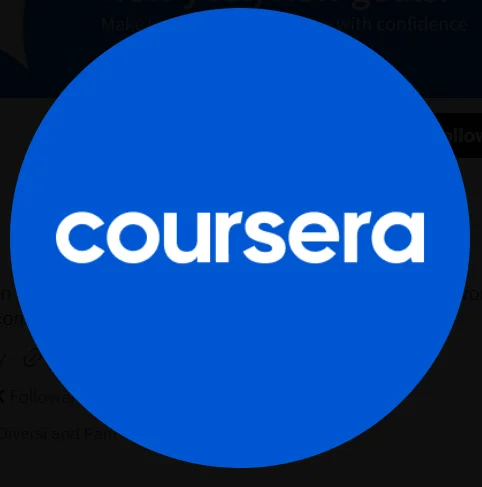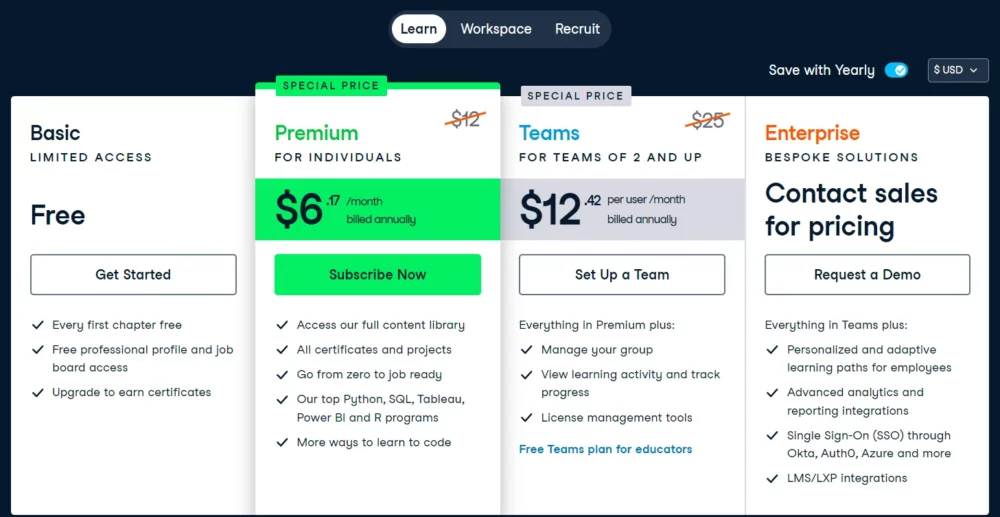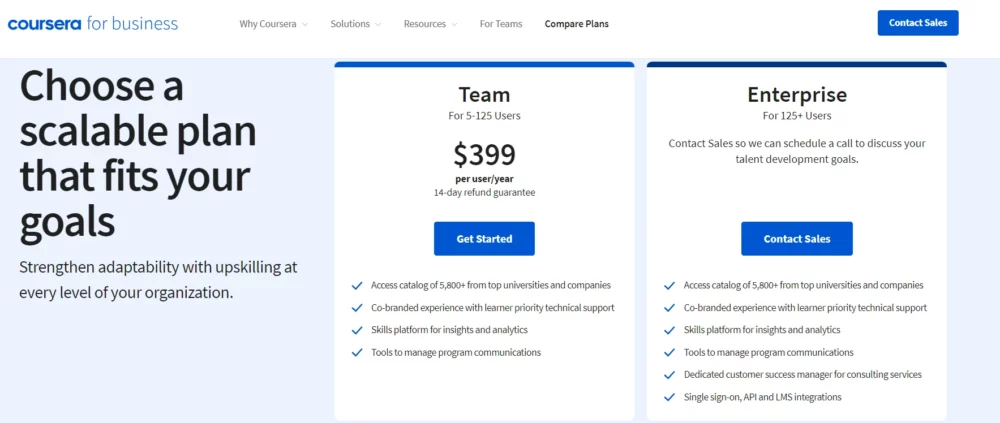Hey everyone! Today, I’m diving into a hot topic: DataCamp vs. Coursera.
As someone always on the hunt for the best online learning platforms, I’ve spent hours on both sites, trying to boost my skills.
You know, it’s tough choosing where to learn, especially with so many options out there. I’ll be honest; I was a bit lost at first. But don’t worry, I’ve done the legwork for you.
Whether you’re looking to master data science or add a new skill to your resume, I’ve got the lowdown on how these two giants stack up. Let’s break it down together and find out which one might be your go-to for learning.
Content Outline
The main differences Between Datacamp Vs Coursera
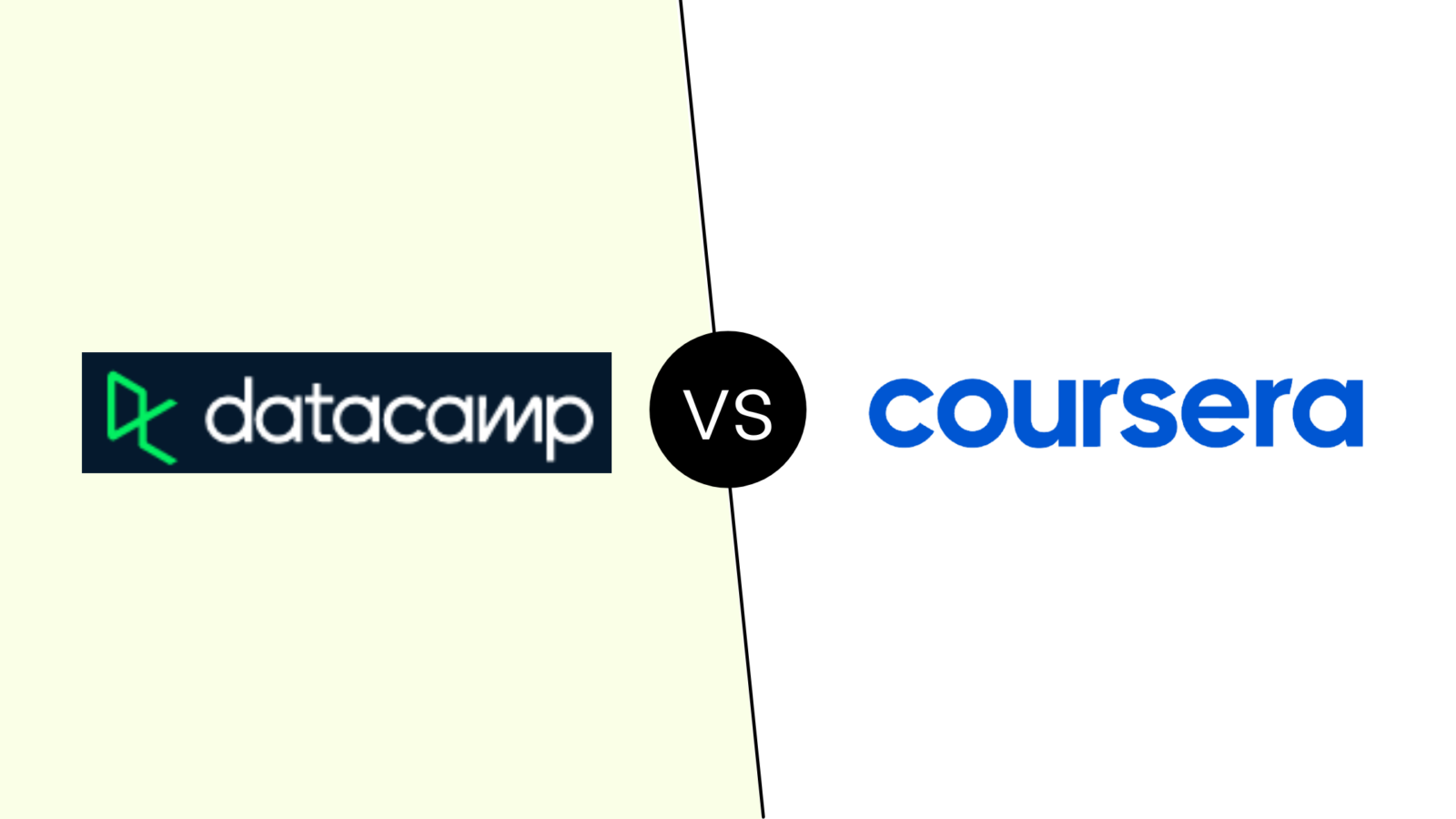
1. DataCamp: Specializes in data science and analytics with courses focused on programming languages (Python, R, SQL), machine learning, and data visualization. Where as Coursera offers a broader range of subjects, including data science, but also covers topics in business, technology, humanities, and more in collaboration with universities and institutions.
2. Datacamp emphasizes interactive learning with hands-on coding exercises and immediate feedback, which is suitable for practical skill-building in data science. Where as Coursera Provides a mix of video lectures, readings, and assignments, with some courses offering more interactive elements, depending on the subject and the partner institution.
3. DataCamp: Mainly targets beginners and intermediate learners in data science, focusing on practical skill development. Where as Coursera Caters to a wide range of learners, from beginners to advanced, and includes professional certificates and degree programs.
What does Datacamp offer?
Datacamp offers a variety of courses in different programming languages, as well as courses on topics such as data science and machine learning.
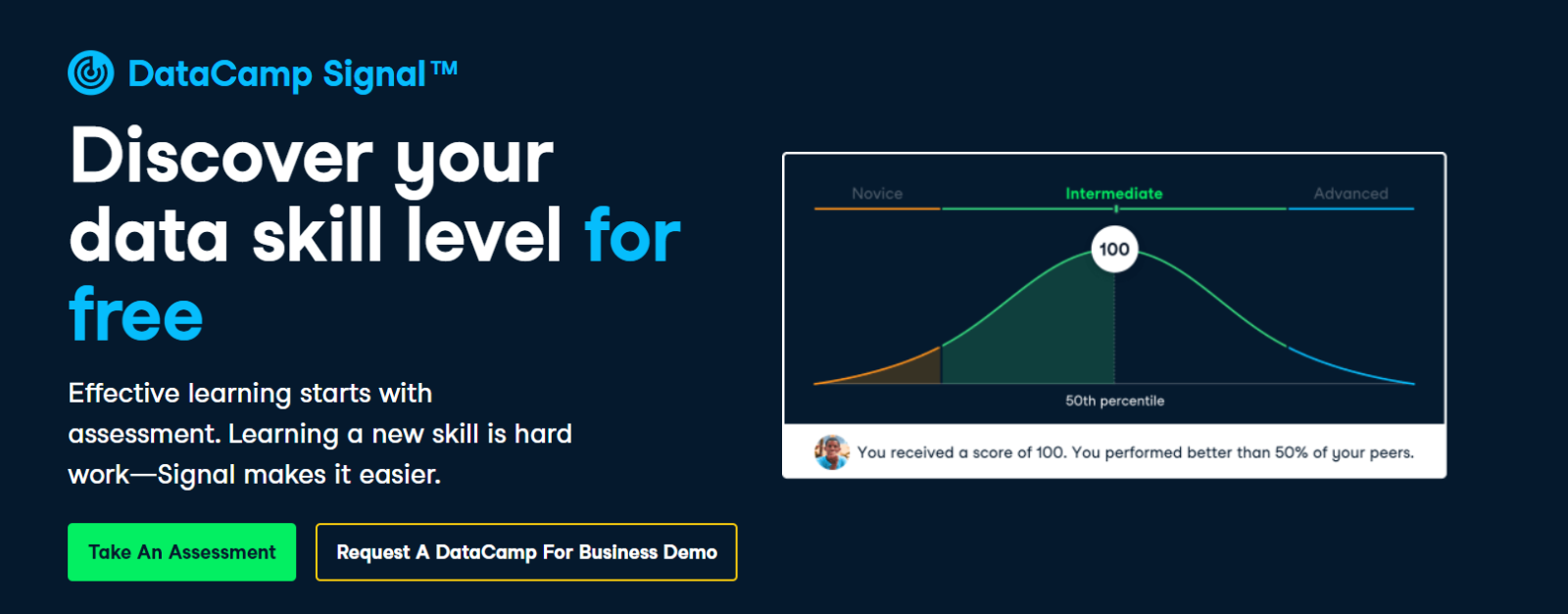
The platform has an interactive interface that makes it easy to follow the lessons, and there is a forum where you can ask questions and get help from other students.
Get the latest discounts and coupons for DataCamp and get the best deals on DataCamp subscriptions.
What does Coursera offer?
Coursera offers courses from a variety of universities and colleges, as well as professional development courses.
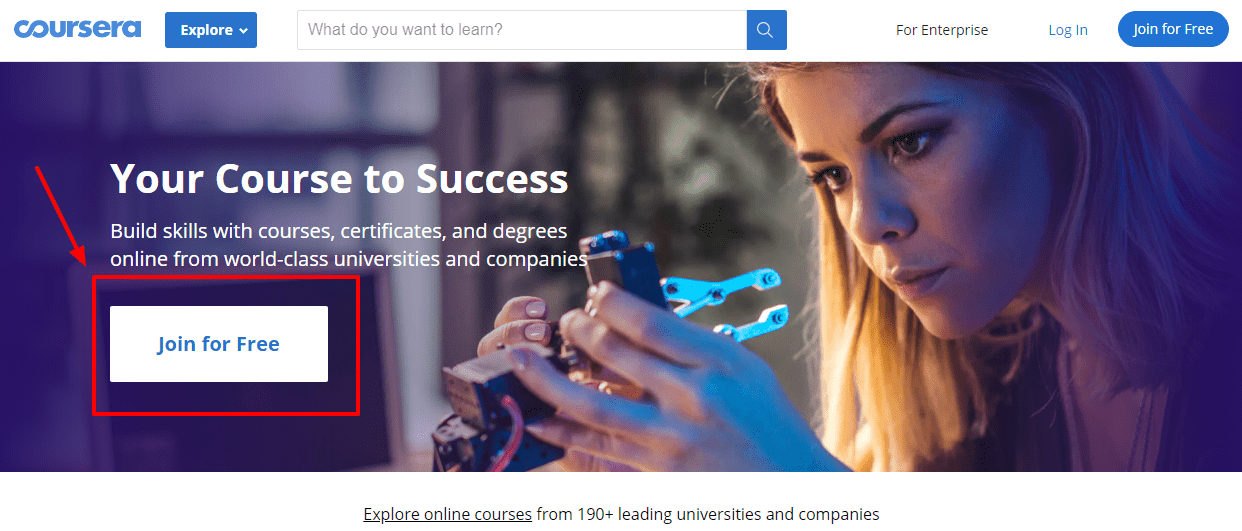
The courses are usually more comprehensive than those offered on Datacamp, and they often include assignments and exams. Courses can be taken at your own pace, or you can choose to take them on a set schedule.
So, which one should you choose?
It depends on your needs and goals. If you want to learn programming languages or brush up on your skills, then Datacamp is a good option.
However, if you want to get a comprehensive education in data science or machine learning, then Coursera is a better choice.
DataCamp vs Coursera Comparison
1. Ease of use
DataCamp offers a streamlined and intuitive user interface, which is particularly advantageous for beginners or those specifically focused on data science and analytics. The platform’s design is straightforward, making it easy to navigate through various courses and track progress.
One of DataCamp’s standout features is its interactive learning environment. This setup allows users to engage directly with coding exercises and receive immediate feedback, an essential aspect of hands-on learning in coding and data analysis.
On the other hand, Coursera, with its broad range of courses from various universities and institutions, offers a more extensive platform. While this diversity is a strength, it can also make the user experience slightly more complex.
Users navigate through a larger catalog of courses, which can be overwhelming for some. However, Coursera counters this by providing a well-organized interface with efficient search and filter tools, course recommendations, and a personalized dashboard to track learning progress.
2. Topics And Languages Taught
Both platforms teach a variety of programming languages, such as Python, R, and SQL.
However, Coursera also offers courses in other areas, such as business and marketing. Datacamp focuses mainly on data science and machine learning.
3. Language support
DataCamp primarily offers its courses in English, focusing on a specific audience primarily comfortable with English. This focus allows them to concentrate on the quality of their data science and analytics content.
However, the limitation to primarily English content can be a barrier for non-English speaking users or those who prefer learning in their native language. This aspect is important to consider for global SEO strategies where multilingual support can be a significant factor in user engagement and satisfaction.
Coursera, in contrast, stands out for its extensive language support. Due to its global partnerships with universities and institutions, Coursera offers a wide array of courses in multiple languages or, at the very least, provides subtitles in various languages.
This inclusivity significantly broadens its reach, catering to a global audience. The platform’s ability to offer content in a user’s native language not only enhances the learning experience but also aligns well with SEO strategies aimed at a diverse, international audience.
4. course quality
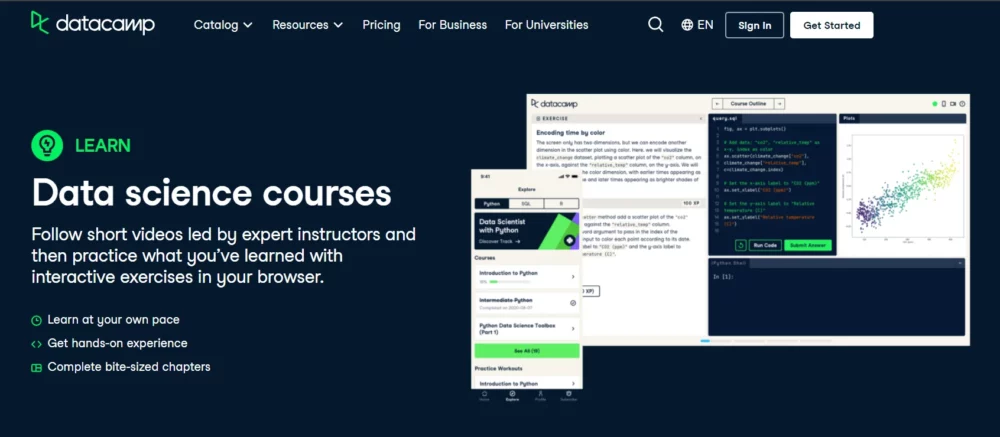
DataCamp specializes in data science and analytics courses. Its strength lies in the quality of interactive, hands-on learning experiences it offers. Courses are designed with a practical approach, allowing learners to engage directly with coding exercises and real-world scenarios. This method is particularly effective for subjects like programming and data analysis, where applied learning is crucial.
Coursera, in contrast, partners with universities and educational institutions worldwide to offer a wide range of courses across various disciplines. The quality of Coursera’s courses is bolstered by its collaboration with renowned institutions, providing learners with access to university-level education. The courses on Coursera range from lectures and readings to hands-on projects, depending on the subject and the partner institution.
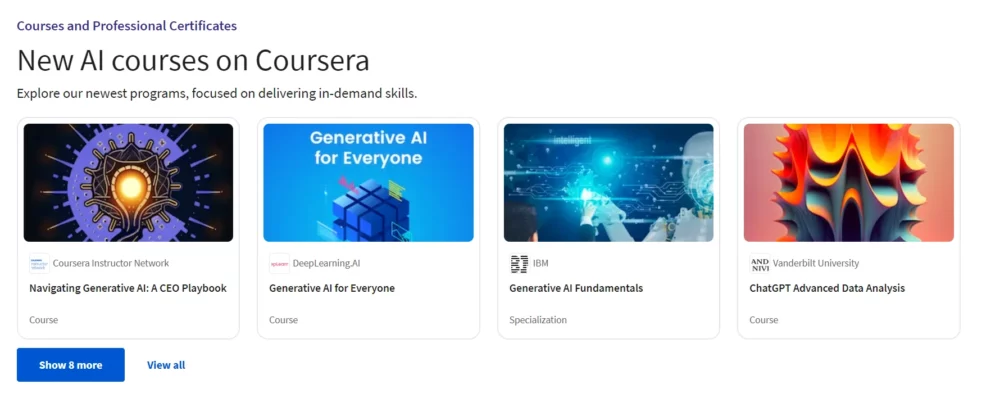
In terms of course quality, DataCamp provides a consistently high-quality, interactive learning experience in its niche of data science, making it an excellent choice for those seeking practical, applied learning in this field. Coursera, with its broad academic partnerships, offers more in terms of variety and academic depth, appealing to a wide audience with different learning goals.
5. Structure
Datacamp’s courses are interactive and easy to follow.
Each lesson includes a video, followed by exercises that you can do on your own computer. There is also a forum where you can ask questions and get help from other students.
Coursera’s courses are more comprehensive than Datacamp, and they often include assignments and exams. Courses can be taken at your own pace, or you can choose to take them on a set schedule.
6. Certification
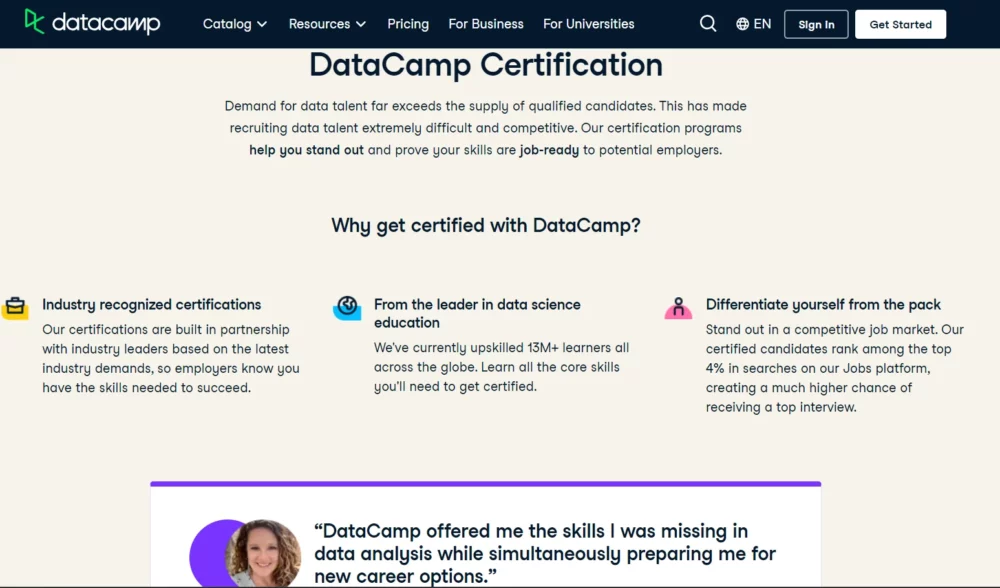
DataCamp offers certificates upon the completion of its courses and tracks. These certificates primarily serve as a testament to the completion of specific data science and analytics courses.
They are well-regarded within the data science community for demonstrating practical, hands-on skills in programming languages like Python, R, and SQL.
However, it’s important to note that these certifications are not formally accredited by educational institutions or recognized in academia. For professionals looking to showcase their skills in data science and analytics, particularly in industry settings, DataCamp certificates can be a valuable addition to their portfolios.
Coursera’s certifications have a broader scope due to its partnerships with universities and institutions. Many of its courses offer certifications that are accredited and carry weight in both academic and professional contexts.
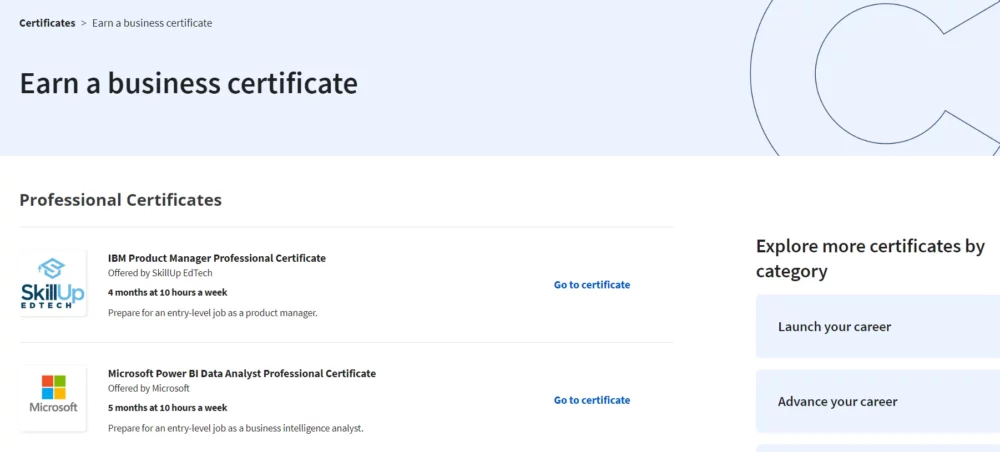
Coursera provides not only course completion certificates but also professional certificates, specializations, and even full degree programs. These certificates and degrees are issued in collaboration with its partner universities, adding to their credibility and recognition.
7. Job Placement
Datacamp does not offer job placement services.
Coursera offers a Job Placement program that helps you find a job after completing one of their courses. The program includes access to a job board, as well as career counseling and coaching.
Datacamp vs Coursera: Pros & Cons
Datacamp pros and cons
| Datacamp Pros | Datacamp Cons |
|---|---|
| High-quality interactive courses | Limited to data science fields |
| Expert instructors | Primarily for beginner to intermediate levels |
| Wide range of data science topics | Less focus on theoretical aspects |
| Regular course updates | Primarily for beginner to intermediate levels |
| Hands-on learning with projects | |
| The subscription model offers full access. | |
| User-friendly interface | |
| Career-oriented paths and skill tracks |
Coursera pros and cons
| Coursera Pros | Coursera Cons |
|---|---|
| Diverse course offerings | Subscription can be expensive |
| Partnerships with top universities | Certificates may not be valued by all employers |
| Flexible learning schedules | Limited hands-on experience in some courses |
| Courses available in multiple languages | Some courses require prerequisite knowledge |
| Offers accredited degrees and certificates | Peer reviews can be inconsistent |
| Free audit option for many courses | Premium content locked behind a paywall |
| Self-paced learning | Requires self-discipline and motivation |
| Community forums for peer support | Some courses may not be updated regularly |
You may also like:
Datacamp vs Coursera: Overall
Coursera is a more comprehensive option than Datacamp, and it offers a variety of courses in addition to programming languages
The courses can be taken at your own pace, and there is a Job Guarantee program available.
Datacamp is a good option if you want to focus on one specific topic, such as data science or R programming.
The courses are interactive and shorter in length than Coursera’s courses. There is no job placement or certification available through Datacamp.
So, what’s the verdict?
In conclusion, both Datacamp and Coursera offer great resources for learning data science and programming.
Coursera is the better option if you want to learn a variety of topics, while Datacamp is better if you want to focus on one specific topic.
Datacamp does not offer job placement or certification services, while Coursera offers both of these services.


